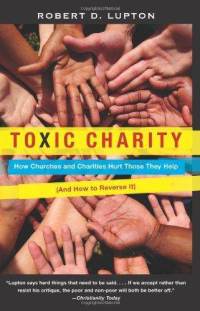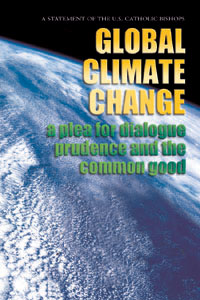At a reception before the start of a Catholic conference on climate change earlier this month in Washington, I asked Bishop Donald Kettler of Fairbanks, Alaska, what brought him to such an event. “One of our villages will be under water in 10 years,” he replied instantly. He was speaking of a coastal community populated by indigenous people—soon to be washed away by rising sea levels resulting from climate change.
I didn’t get the impression, from my conversations with him or from perusing his diocese’s web site, that Kettler is what you’d call a progressive bishop. A big, avuncular man with thick brown eyebrows and a balding head, he seems to go along with the general drift of the American Catholic hierarchy. Which is to say, a largely conservative drift. For example, he has been a frequent objector to the Obama administration’s birth-control mandate, calling it “morally disturbing and contrary to God’s law.”
But a village in his diocese (including its Catholic church) is disappearing from the earth’s surface. If you exist in a reality-based world, as the bishop surely does, such an experience is bound to alter your course.
Yet the story Kettler tells is not nearly as alarming as what I heard from Bishop Bernard Unabali of Papua New Guinea. His diocese includes a raft of islands that are also vanishing under the sea, and many of the islanders have already fled. They have been called the world’s first climate-change refugees, although others (including some of Kettler’s flock) are not far behind.
The link to my December 2 article about the conference is currently open only to subscribers of Our Sunday Visitor, but it’s posted here below.
If I had more space, I would have said more about a lively, interesting group, the Catholic Coalition on Climate Change, which cosponsored the conference. Based in Washington, its main instrument is the Catholic Climate Covenant, which is calling on Catholics and others nationwide to sign “The Saint Francis Pledge to Care for Creation and the Poor.” Take the pledge here, if you are so inclined. And learn more about the whole campaign here.
The organization is trying to reach the broad middle of American Catholic laity, according to its executive director, Dan Misleh. The message isn’t aimed primarily at Roman Catholic tree-huggers (there are more of those than you’d think) or people who would like to see the environmental movement disappear along with the Carteret Islands.
“We’re never going to be the Sierra Club at prayer,” Misleh told me, referring to the Catholic community. “But this is part of who we are as Catholics, part of what the church teaches about care for creation. And we’re getting a whole lot less pushback than we used to.” He was speaking in that breath of the coalition, launched in 2006.
But as I was saying about the bishops and the climate exiles—here’s the report I filed on the conference.
During a talk last month at Catholic University in Washington, Bishop Bernard Unabali unfolded a long rectangular cloth depicting a map of his diocese in Papua New Guinea. Someone from the first row volunteered to hold up one end of the brown-and-yellow cloth, and the bishop pointed to a half-dozen populated islands to the north. Each one “will completely vanish” in the next 20-30 years, due to rising sea levels associated with climate change, he explained.
Bishop Unabali delivered the keynote address at a Nov. 8-10 symposium titled “A Catholic Consultation on Environmental Justice and Climate Change.” Just before the start of the gathering, a reporter asked Bishop Donald Kettler of Fairbanks, Alaska, why he was there. The bishop replied, “One of our villages will be under water in 10 years.” He was referring to a community of Native Alaskans on the Bering Sea.
The comments by these two prelates underscored an atmosphere of urgency bordering on crisis at the meeting sponsored by three organizations including the U.S. Conference of Catholic Bishops. But the scholars and experts who spoke there also took a step back to look how Catholic faith can help nurture a balanced environmental ethic.
In Catholic discussions of this kind, St. Francis of Assisi, patron saint of ecology, is usually invoked early and often. And his praises did not go unsung at this gathering, which pulled together nearly 60 scholars including Franciscan Brother Keith Douglass Warner, a theologian and environmental scientist at Santa Clara University. Wearing a brown tunic girded by a white rope belt, he conveyed the Franciscan view that Creation, because it reveals the hand of God, plays “an essential role in salvation history.”
And yet, the papers dealt far less with the man from Assisi than with the bishop of Rome. The subtitle of the symposium was “Assessing Pope Benedict XVI’s Ecological Vision for the Catholic Church in the United States.” Speakers pointed out that he is the first pope to regularly tackle environmental questions, the first to devote a chapter of an encyclical (Caritas in Veritate, in 2009) to these concerns.
A number of conference goers carried around a little book titled simply The Environment, a collection of statements by the Pope (published last spring by Our Sunday Visitor).
There is, for instance, Benedict’s 2009 remark to an interviewer that he feels “an inner obligation to struggle for the preservation of the environment and to oppose the destruction of creation.” He told the Vatican Diplomatic Corps a year later: “If we wish to build true peace, how can we separate, or even set at odds, the protection of the environment and the protection of human life, including the life of the unborn?”
The presentations in Washington indicated that an official Catholic teaching on the environment is emerging—and its key principles revolve around concerns about the person, the poor, and the common good. For example, while modern-day environmentalism often exalts nature over people, the Church looks upon human beings as “the guardians of Creation, which God has entrusted to us,” said Mary A. Ashley of the Graduate Theological Union in Berkeley, California. “We have a vocation to care for every creature.”
Joining with the bishops’ conference to sponsor the consultation were the Catholic Coalition on Climate Change, which represents a dozen national organizations, and Catholic University’s Institute for Policy Research and Catholic Studies. Setting the urgent tone was Bishop Unabali’s public lecture that kicked off the meeting on Thursday night, November 8.
After making a few self-deprecating jokes about, among other things, his diminutive size, the bishop spoke in his stilted English of the need for “right relationships” with God and creation. He unfurled the cotton cloth with the map of his Diocese of Bougainville, which includes the outlying Carteret Islands, home to several thousand people. And then he talked about coconuts.
The coconut tree is a staple of sustenance in those South Pacific islands, but higher sea levels mean that salt is inundating the ground and mutating the crops. “The size of the coconut is shrinking,” Bishop Unabali said. Worse, the liquid extracted from them—a primary source of island water—is becoming undrinkable. “It’s too salty now,” he said later in an interview.
The islands are expected to be uninhabitable in the next few years, long before they disappear under the sea. The diocese is spearheading an effort to relocate the residents (nearly all are Catholic) to higher ground in Bougainville, a major island east of the mainland. Some have already fled, making them what many describe as the world’s first climate-change refugees.
With a smile, the bishop acknowledged that not everyone is persuaded by the science of climate change.
“But I say it’s real. It affects everyone, not just small islands. It’s affecting you, too,” he said, waving a finger up and down the tiered lecture room filled with students and members of the public in addition to consultation participants. “It’s come to New York,” he added, alluding to Hurricane Sandy.
Like his brother bishop 6,000 miles away, Bishop Kettler of Fairbanks is responding to the plight of those whose land will soon be submerged along with their local Catholic church. He said in an interview that some 300 Native Alaskan families in the Bering Sea village are affected. The diocese hopes to raise funds for their relocation to a less-endangered outpost that could sustain their culture of fishing and trapping.
The bishop noted that some Alaskans have wondered why these families don’t just resettle in urban areas, where ecological threats do not loom as large. But he added a bit wryly, referring to western Alaska’s indigenous people—“They’ve only been there for 8,000 years.”
Sentiment at the gathering ran strongly in favor of immediate efforts to curtail carbon emissions linked by most scientists to climate change. There was, however, some pushback when one presenter pointed a finger at Catholics who decamp to the suburbs, where ever-larger houses and gas-hogging cars abound. These people are unwittingly part of the problem and are participating in a “structure of sin,” he said.
In the Q&A that followed, a young theologian objected. He said his family intends to buy a suburban home, a decision that has less to do with “hedonism” (a keyword in the preceding talk) than with the desire for “a safer neighborhood and a better school system for my children.”
Still, retired Bishop William Skylstad of Spokane, Washington—one of five American bishops in attendance—caught the general mood when he warned of multiple environmental crises. He noted, for example, that people are dying every day for lack of clean, potable water, and he adjourned the meeting with these words: “The time is now. The urgency is now.” …read more









